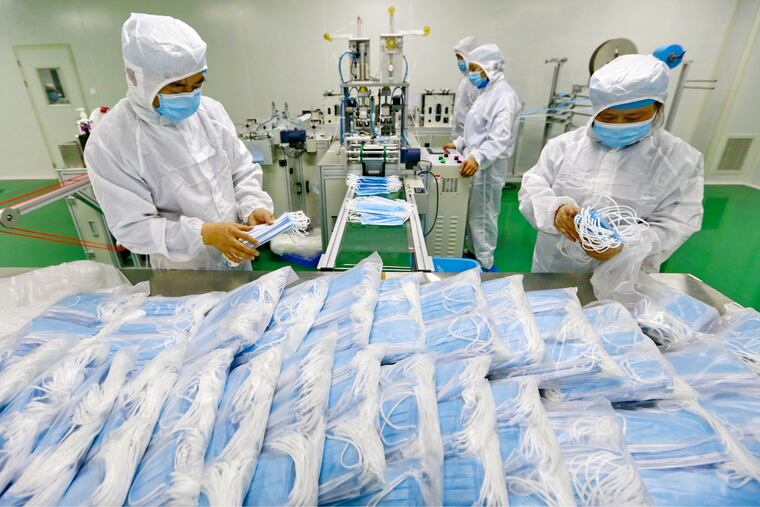Nursing homes are running out of protective equipment amid coronavirus pandemic
An official said he knew of one place where staff members were using trash bags as gowns and making their own masks.

A national organization that represents nursing homes and assisted-living facilities said Wednesday that there already are sporadic shortages of protective equipment for staff and that 20% of facilities say they could run out of masks and gowns next week. Another 20% would run out the week after that, according to the American Health Care Association.
The group is calling for people who do not currently need protective equipment to share their inventories with medical providers, and lauded dentists in Ohio for doing so. It also said it has talked with the Centers for Disease Control and Prevention about stretching supplies during the coronavirus pandemic by doing things like wearing masks and safety goggles for a longer period of time.
“We need to really take drastic action to conserve masks and gowns going forward,” said David Gifford, the organization’s chief medical director.
He said he knew of one place where staff members were using trash bags as gowns and making their own masks. He discouraged looking up how to make your own mask on the internet and hoped the CDC would provide information about that.
In guidance issued Wednesday, the CDC said that facilities that have run out masks could consider homemade masks, such as scarves or bandannas, as a “last resort” but that their ability to protect health care workers is “unknown.” Ideally, the agency said, such masks should be used with shields that cover the entire front of the face. During “severe resource limitations,” the CDC said, facilities should “consider” excluding older workers and those with chronic medical considerations from care of patients with confirmed or suspected coronavirus infection.
Based on news reports, Gifford said he was aware of 20 to 30 facilities that have had cases of the new disease. He said facilities should “assume it’s in your community and take action now.”
AHCA and the CDC have released guidance on restricting visitors to communities that serve the elderly, limiting activities, and spreading residents out as much as possible. Death rates are highest in people over age 80, the most populous group in nursing homes and assisted-living facilities.
Mark Parkinson, the organization’s president and CEO, compared efforts to combat the threat of the novel coronavirus to sacrifices Americans had to make during World War II.
“The reaction of the public over the next 30 to 60 days and how it manages this will literally decide whether thousands and possibly tens of thousands of older people who live in our facilities live or die,” he said.
Gifford said shortages stem from a “perfect storm” of disruption of the supply chain along with increased demand because the virus is circulating at the same time as flu and other respiratory viruses with similar symptoms. “It would be very hard to have predicted that a virus would attack in the very community that makes the majority of gowns and masks that supply America,” he said, referring to China.
Shayna Varner, director of communications for the Pennsylvania Health Care Association, said none of its providers had run out of protective equipment Wednesday, but supplies were running low and staffs are conserving what they have. She said the Pennsylvania Department of Health has notified the group that its providers can only receive emergency supplies of protective gear if they have an active case of COVID-19 in the facility.
Parkinson called for federal support to help nursing homes and assisted-living facilities hire extra workers to deal with the virus. Gifford said that while many workers have been home sick with seasonal viruses, he has not heard of workers refusing to come to work because of the virus. On the contrary, he said, many were eager to care for people they consider family.
David Owsiany, executive director of the Ohio Dental Association, said his state has told dentists to see emergency patients only, which reduces their need for masks and gloves. On Monday, the governor asked dentists to donate any protective equipment they could spare to their local emergency management agency, a request the association supports. Owsiany said he has heard from dentists in Toledo and Belmont County who are spearheading drives to collect the equipment.
“It’s not going to solve the problem at all, but every little bit helps is our message,” he said.
For now, dentists are not being paid for the supplies. Owsiany said that one of them joked, “If I give them enough masks, can I get some toilet paper?”